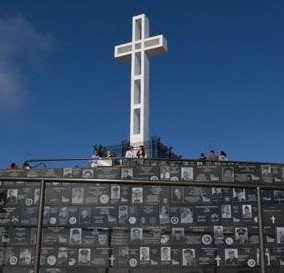
U.S. court says Christian cross is unconstitutional
Brian Fitzpatrick
A three-judge panel of the Ninth Circuit Court of Appeals has decided a memorial cross on federal land on Mt. Soledad, Calif., violates the U.S. Constitution.
In a 3-0 ruling in the Jewish War Veterans v. City of San Diego case, the panel decided that the 29-foot concrete cross, which has stood for 57 years, constitutes a government endorsement of religion and therefore violates the First Amendment's establishment clause.
"The question, then, is whether the entirety of the Mount Soledad Memorial, when understood against the background of its particular history and setting, projects a government endorsement of Christianity. We conclude it does," wrote Circuit Judge M. Margaret McKeown, a Clinton appointee.
"The decision represents a judicial slap in the face to the countless military veterans honored by this memorial," said Jay Sekulow, chief counsel of the American Center for Law and Justice, which filed an amicus brief in the case on behalf of 25 members of Congress. "This flawed decision not only strikes at the heart of honoring our military veterans, it reaches a faulty conclusion that this iconic memorial – part of the historic landscape of San Diego – is unconstitutional. We believe the appeals court got this decision wrong and we look forward to the case going to the Supreme Court where we're confident this decision will be overturned."
"Unfortunately, the decision does not surprise me based on the philosophical beliefs and records of the judges on the panel. The decision was more likely than not," said Alliance Defense Fund Senior Counsel Joe Infranco. ADF filed an amicus brief in the case on behalf of the American Legion.
"The panel has an extreme view of the establishment clause that amounts to hostility to religion," Infranco explained. "The Constitution requires that religious views and expressions be accommodated. There's a kind of disconnect in the way certain judges look at the establishment clause, and it becomes a vehicle for hostility to religious expression.
"If the case had come up in a different federal circuit, there likely would have been a different result," said Infranco. The Ninth Circuit, infamous for its activist decisions, is the most-reversed of America's circuit courts.
"The veterans are outraged over these cases. All the plaintiffs do is find a few individuals who claim to be offended by that cross at the site, and the premise of this lawsuit is the offense of a few individuals trumps the way veterans choose to honor fallen veterans. Veterans should be allowed to honor heroes, many of whom gave their lives for this nation, in the manner they choose," Infranco added.

